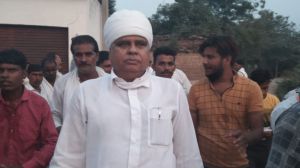University blues
While covering the university campus as a reporter, a senior colleague remarked, quot;University is the best way to learn politics.quot...

While covering the university campus as a reporter, a senior colleague remarked, quot;University is the best way to learn politics.quot; The idealist in me shrugged at the remark: quot;University and politics, never.quot;
For me, the university was the place where great minds met to discuss greater issues. It was the place where philosophy and particle physics intermingled to offer new insights about the philosophical aspects of matter, or gave new interpretations on the materialistic aspects of philosophy. This was the place where social thought originated and where solutions to complex issues were sorted out.
However, it was the experience of the senior colleague which proved to be correct, overriding my youthful idealism. In the elections to the senate of Panjab University, a Congressman was busy at the polling station seeking votes for two candidates 8212; one a leftist and the other aligned with the BJP. He made sure he was politically correct. The voter slips bearing the name of the leftist candidate were held in his left hand, the BJP slips in his right. His aim: to defeat two Congress candidate in the election!
The campus was to provide other culture shocks as well. It continued to be a place where you could see half the people pursue learning and the other half learn pursuing. The famous student centre would continue to be the place where both would converge.
At the academic level, Panjab University for one would never really be able to come out of the fossil fraud. Their were some who would seek to bury the fossils, while others would dig them out in the open again.
The university, after adding post-graduates by the hundreds to the unemployment market every year, could not find a suitable post-graduate for the post of university registrar for seven years. University politicians would spend a year fighting for reduction in the qualifications of the university registrar from that of a suitable first class post-graduate.
Intrigue ensured that minimum qualifications were lowered to suit those entrenched in the administrative machinery. Amidst the infighting, the sacrifice of the first registrar of Panjab University, who was murdered at Lahore in 1948 trying to retrieve the assets of the university divided by Partition, was all but forgotten.
Campus also proved the age old dictum: the more it changes, the more it remains the same. The young Turks were a boisterous presence, and would match the old guard with their vile. Having learnt the tricks of the trade from the old guard, they would indulge in those very tricks to oust their predecessors 8212; only to commit the same mistakes again.
Which takes me to an anecdote which is a part of campus folk lore. A middle-aged man walks into the campus after two decades. One look around, and he says: quot;What a campus 8212; two decades and nothing has changed!quot; He visits the library, the canteen, the market, the classroom and everywhere he mutters: quot;Two decades and nothing has changed 8212; the same library, the same canteen, the same market, the same classroom.quot; Finally he enters the boysacirc;euro;trade; hostel and locates the room where he spent his youthful years. Entering the room, he spots a girl trying to escape from the balcony. quot;Two decades and same old habits,quot; he mutters again. Embarrassed at being caught, the hostel resident explains, quot;She is my cousin.quot; To which our visitor remarks, quot;Two decades and even the excuse is the same.quot;
This anecdote was narrated to me by the university sweetshop owner who incidentally is a post-graduate from the campus itself. Old timers say he has been narrating it for two decades.
- 01
- 02
- 03
- 04
- 05































